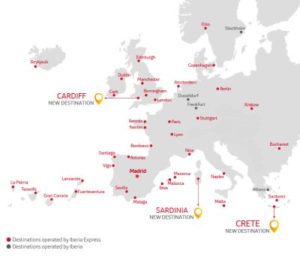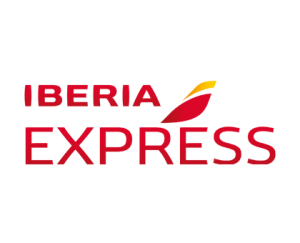Buy Iberia Express Flight Ticket
About Iberia Express
Iberia Express, a subsidiary of Spain’s flagship carrier Iberia Airlines, has been making a significant impact on the European aviation scene since its establishment in 2012. Launched as a response to the growing demand for efficient, low-cost air travel, Iberia Express has quickly become a pivotal player in the competitive European market.
The Birth of Iberia Express
The idea for Iberia Express emerged from a need for a more efficient and competitive approach to short-haul flights. Iberia Airlines, facing the challenges of a shifting industry landscape, decided to create a subsidiary that would focus on optimizing operations for domestic and European routes. Thus, Iberia Express was born in March 2012 as a low-cost carrier with the aim of enhancing efficiency, reducing operating costs, and providing passengers with affordable air travel options.
A Focus on Efficiency
From its inception, Iberia Express prioritized efficiency in all aspects of its operations. The airline’s mission was to deliver cost-effective, punctual, and reliable services, catering to the growing demand for low-cost air travel within Europe. To achieve this goal, Iberia Express adopted several key strategies:
-
Simplified Fleet: The airline chose to operate a fleet of Airbus A320-family aircraft, a decision that streamlined maintenance, training, and operational efficiency. A standardized fleet reduced complexity and improved turnaround times.
-
Point-to-Point Routes: Iberia Express adopted a point-to-point network model, which entailed flying directly between airports rather than relying on a hub-and-spoke system. This approach minimized operating costs and increased efficiency, allowing the airline to pass on savings to passengers.
-
High Aircraft Utilization: The airline embraced a strategy of maximizing aircraft utilization. Reduced turnaround times meant more frequent flights and efficient use of resources.
-
Lean Operations: Iberia Express continually looked for ways to streamline its operations, reduce expenses, and optimize efficiency. This lean approach allowed the airline to offer competitive fares.
Growing Network and Operations
Iberia Express expanded rapidly, adding numerous domestic and international destinations to its network. Its hub at Madrid-Barajas Airport allowed for convenient connections to and from Iberia Airlines’ long-haul flights, strengthening the overall travel experience for passengers.
The airline’s network encompassed a range of European cities, including London, Paris, Frankfurt, Milan, and many others. Iberia Express aimed to provide travelers with a versatile array of options for exploring Europe, from vibrant cultural capitals to scenic holiday destinations.
In-Flight Experience
While Iberia Express’s primary focus was on efficiency and affordability, it also recognized the importance of providing a comfortable and enjoyable in-flight experience for passengers. The airline offered a range of cabin classes, including Economy and Business, each designed to cater to different passenger preferences and needs.
In-flight services were characterized by a commitment to quality and punctuality. Passengers could access a selection of snacks, beverages, and light meals, reflecting a blend of Spanish and international culinary influences. The airline’s cabin crew, trained to prioritize professionalism and customer service, created an atmosphere of hospitality and efficiency, reinforcing the values of both Iberia Express and its parent company.
Frequent Flyer Program and Customer Satisfaction
Iberia Express introduced a frequent flyer program called “Iberia Plus” to reward loyal customers with various perks, including points that could be redeemed for flights, upgrades, and other benefits. This initiative fostered a sense of loyalty and satisfaction among passengers, encouraging repeat business and further solidifying the airline’s reputation.
Customer satisfaction became a hallmark of Iberia Express, with its commitment to providing a reliable, efficient, and punctual travel experience. The airline’s dedication to on-time performance contributed to its reputation for dependability.
Navigating Challenges
Like many airlines, Iberia Express faced challenges, particularly with the impact of the COVID-19 pandemic on the aviation industry. Travel restrictions, reduced demand, and safety concerns posed significant hurdles for the airline.
Iberia Express responded with resilience and adaptability. The airline implemented stringent health and safety protocols, including enhanced cleaning procedures, mask mandates, and social distancing measures on its flights. By adhering to government guidelines and maintaining a strong financial position, the airline was able to weather the storm and continue serving passengers, even during the most challenging times.
The Road Ahead
Iberia Express has several exciting prospects on the horizon. The airline is poised to continue expanding its European network, introducing new routes and strengthening its presence in the competitive European market. Iberia Express aims to provide travelers with even more accessible and convenient air travel options, maintaining its reputation for efficiency and affordability.
Additionally, the airline is actively exploring sustainability initiatives. This includes investing in more fuel-efficient aircraft and researching sustainable aviation fuels. By addressing its environmental impact, Iberia Express aims to contribute to a greener and more eco-friendly aviation industry.
Conclusion
Iberia Express, a subsidiary of Iberia Airlines, has carved a distinctive niche for itself in the European aviation landscape. As a low-cost carrier that prioritizes efficiency and affordability, it caters to travelers seeking cost-effective and reliable air travel options within Europe.
Whether you are a business traveler, a tourist exploring Europe’s diverse destinations, or a passenger valuing an efficient and punctual travel experience, Iberia Express embodies the spirit of Spanish aviation innovation and customer-centric approach. As it navigates the challenges of an ever-evolving aviation landscape and embraces sustainability, Iberia Express remains poised to continue shaping the future of European air travel, offering passengers the opportunity to explore the beauty and diversity of the European continent with convenience and cost-effectiveness.
Iberia Express Baggage
Carry-on Baggage
Hand Baggage is accepted on all fares. The maximum size of 1 piece of hand baggage is 25 x 45 x 56cm.
Checked Baggage
Checked Baggage must not exceed the weight of 23kg. If baggage weighs more than 23kg, an excess weight fee will apply.
Iberia Plus customers traveling Business Class can have 1 additional baggage (not exceeding 23kg) to take on board.
Iberia Express Destinations
A majority of Iberia Express services operate its flights to and from and via Madrid. The following are all the Iberia Express destinations:
Europe
Amsterdam; Copenhagen; Sweden; Berlin; Dublin; Stuttgart; Birmingham; Edinburgh; Lyon; London; Manchester; Nantes; Naples; Nice; Paris; Rennes; Bordeaux; Cardiff; Sardinia; Malta; Bucharest; Crete
Canary Islands
Gran Canaria; Tenerife: Fuerteventura; Lanzarote; Santa Cruz de la Palma; Tenerife
Spain and the Balearic Islands
Seville; Malaga; Ibiza; Vigo; Palma de Mallorca; Menorca; Vigo; Asturias; Madrid
Iberia Express Fleet
As of September 2016, Iberia Express fleet comprises of the following aircraft:
18 x Airbus A320-200
3 x Airbus A321-200
Iberia Express Route Map

Economy Class
Economy Class is one of two cabin classes that Iberia Express offers.
Economy Class Facilities
Economy Class offers a comfortable cabin with a good level of service.
Passengers can order food and drink from the airline’s inflight menu, which is inclusive of sweet and savoury items such as sandwiches, baguettes and other snacks. As well as a full drinks menu with both alcoholic and non-alcoholic options.
Economy Class Seats
Iberia Express use specially designed slim seats which give extra legroom and extra space between rows. The seats also contribute to the airline’s efforts to stay environmentally-friendly by reducing the amount of fuel burned when flying.
Premium Economy
Iberia Express doesn’t have a First Class cabin. However, its Business Class is similar to other airlines Premium Economy in terms of price and service.
Business Class
Iberia Express Business Class cabin offers a higher standard of service, with more seat room and some extra perks on the ground too!
Business Class Facilities
Depending on which airport you’re flying from, Business Class tickets will gain you access to the airport executive lounge, as well as priority check-in and boarding.
Inflight, passengers can enjoy a range of different food from the Business Class inflight menu. Passengers will be served breakfast, lunch or dinner depending on which time of the day that they fly at, as well as additional hot and cold snacks and drinks.
What are Business Class Seats Like?
Iberia Express’ slim seats in Business Class are set out in a 3 x 3 formation, with the middle seat left vacant as to give extra room and comfort for each passenger.
First Class
Iberia Express doesn’t offer First Class.
Buy Iberia Express Flight’s Ticket with PayPal or Debit Card
Buy your flight’s ticket with Fastofly and use PayPal or Debit Card! A great, convenient way to use for your air travel with Iberia Express.
Other Payment Methods
- PayPal
- Stripe
- Amazon Pay
- X-Payments
- Braintree
- Due
- GoCardless
- SecurePay
- Adyen
- Visa
- American express
- Discovery
- Master Card

